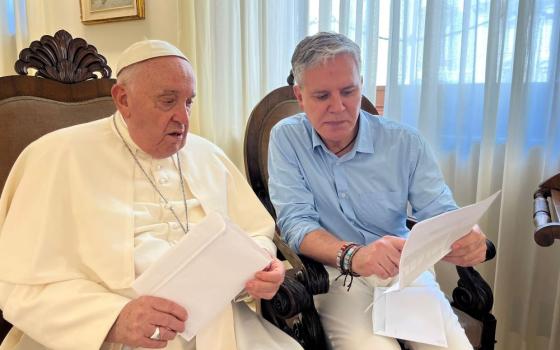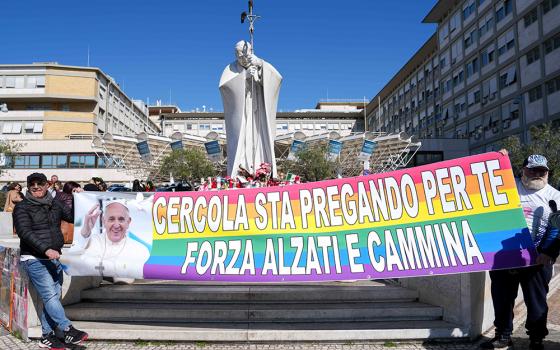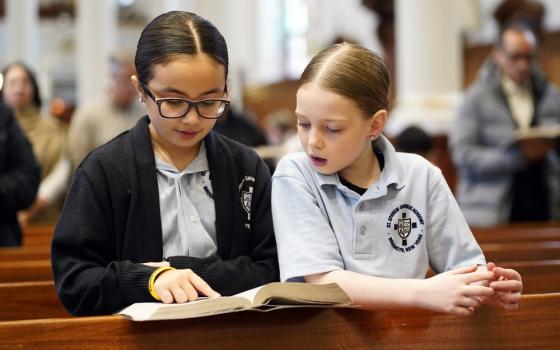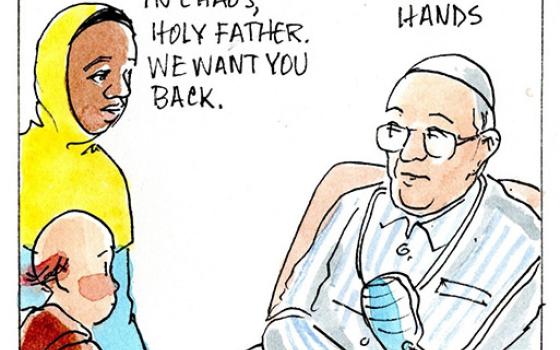
Pope Francis and participants begin a working session of the assembly of the Synod of Bishops in the Vatican's Paul VI Audience Hall, Oct. 13, 2023. (CNS/Lola Gomez)
I was struck by the Gospel reading on Sunday (Aug. 25) in which John, speaking about Jesus' followers, wrote that "many of his disciples returned to their former way of life and no longer accompanied him."
The image made me sad, because it seemed to reflect what is going on in the Catholic Church and in other American Christian churches. Many people are no longer coming to church or identifying as Christian, especially young people, and more especially women, who have long been the backbone of the church.
In the 19th century in Europe, the Catholic Church lost men because of the church's opposition to liberal reforms: free press, free speech, freedom of religion, labor unions and democracy. The church's involvement in politics fed the flames of anticlericalism and drove men out of the church.
Anyone familiar with this history should not be surprised that both the Catholic Church and evangelical Christian churches are losing members because of their churches' political stances. Sadly, I predicted this at the end of the 20th century in an article that appeared in the Jesuit magazine America in June of 1997, "2001 and Beyond: Preparing the Church for the Next Millennium."
Women are angry at the church's opposition to abortion, in vitro fertilization and birth control. For decades, Catholic and evangelical leaders have made abortion the issue that trumped all others, which meant allying with Republicans, who otherwise voted against programs that would help women raise their children.
Women are also angry at not being treated as equals, not only in their being excluded from ministry, but in frequent encounters with male ministers who reeked of a patriarchal culture. Women have advanced in education, politics, business and professions but are still treated as second-class citizens in the church.
Add to this the sexual abuse of children and women by Catholic priests and evangelical ministers, and you have a perfect storm that pushed women to abandon their churches.
This is a disaster for the churches because women have always done the heavy lifting in passing on the faith to the next generation as mothers and religious educators. If women in the Catholic Church become anticlerical, don't expect their sons to become priests.

From left to right: Irish Redemptorist Fr. Tony Flannery, Polish activist Alicja Baranowska, British activist Pat Brown, U.S. Anglican Rev. Dana English, Kate McElwee, Erin Saiz Hanna, Miriam Duignan and Jamie Manson hold a sign supporting women's ordination in front of St. Peter's Basilica on June 3, 2016. (NCR photo)
But for Catholics, the crisis is not only about women; it is also about the declining numbers of priests and religious. In 1965, there were almost 60,000 priests and 178,740 religious sisters in the United States. In 2023 there were 34,092 priests and 35,680 sisters. Even many of these are elderly.
All over the country, seminaries and religious houses are closing or are half empty. For priesthood, celibacy is obviously the problem. Protestant churches have comparatively little problem finding clergy. If you screen out women, gays and married people, you severely deplete the pool of candidates.
Maybe this is the only way to end clericalism in the Catholic Church: by eliminating the clergy. Maybe God knows what she is doing.
For a while, conservatives blamed the decline of Christianity on liberal reforms in the mainline Protestant churches. But the recent decline of the Southern Baptists has put this theory in the trash bin.

Priests lie prostrate during their ordination by Pope Francis during a Mass in St. Peter's Basilica at the Vatican April 22, 2018. The pope urged the new priests to be merciful with people who approach them, especially in the confessional. (CNS/Reuters/Tony Gentile)
Nor did the conservative era in the Catholic Church under Popes John Paul II and Benedict XVI stanch the bleeding: Those trained and ordained in seminaries filled with conservative faculties promoted under John Paul and Benedict show retention rates no better than those produced by earlier, more progressive faculties.
And little wonder. The conservative bishops appointed by these popes suppressed any creative thinking not in line with orthodoxy as they interpreted it. Though they kept some of the external reforms of the Second Vatican Council, such as the vernacular liturgy, they extinguished the spirit of collegiality and free discussion released by the council.
Advertisement
Pope Francis is trying to revive that spirit by allowing free discussion in the church and by encouraging synodality, reopening a window that was created by Pope John XXIII but closed by John Paul II.
I fear that, despite Francis' efforts, it may be too late. The damage has been done. Francis has warned bishops and priests away from clericalism and invited them to synodality, but there is great resistance. It will take decades to recruit new bishops who will appoint new seminary faculty who will educate a new generation of priests. Remember, John Paul and Benedict had nearly 35 years* to reform the reform. Francis has only had 11.
There is always hope. In last Friday's reading from Ezekiel, the Israelite priest and prophet of the biblical book bearing his name, walked through a field filled with dry bones. He is told to prophesy, "Dry bones, hear the word of the Lord!"
The Lord God then says to these bones: "See! I will bring spirit into you, that you may come to life. I will put sinews upon you, make flesh grow over you, cover you with skin, and put spirit in you so that you may come to life and know that I am the Lord."
The Lord God continues: "From the four winds come, O spirit, and breathe into these slain that they may come to life." Ezekiel reports that "the spirit came into them; they came alive and stood upright, a vast army."
This prophecy was given to Israel because the whole house of Israel had been saying, "Our bones are dried up, our hope is lost, and we are cut off."
With a compassionate and loving God, hope is never dead. He breathed the Spirit into the church's dry bones at Vatican II. He will do so again.
*This column has been updated to clarify a sentence about the pontificates of John Paul II and Benedict XVI.







